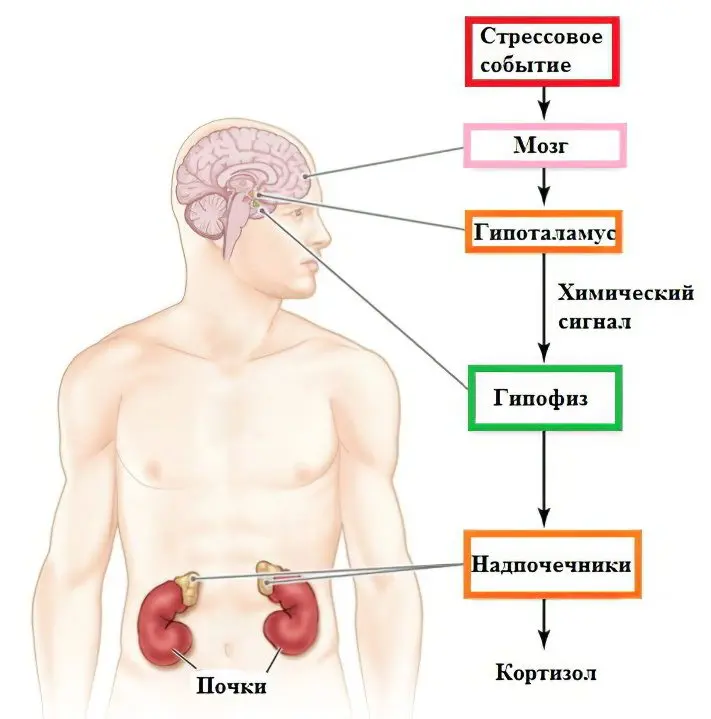Contents

Cortisol is a hormone from the group of glucocorticoids. Its level in the blood rises with a wide variety of processes occurring in the body, in addition, it is directly involved in the metabolism of proteins, fats and carbohydrates.
Adrenocorticotropic hormone stimulates the production of cortisol. The production of cortisol is carried out by the adrenal glands, namely their middle and bundle layers. Cortisol is produced from cholesterol. In a day in an adult, 30 mg of this hormone is produced in the body. If a person is stressed, or he is injured, or his blood glucose level rises, then more cortisol will be produced. The higher the level of cortisol, the lower the level of adrenocorticotropic hormone and corticoliberin.
Cortisol in the blood is determined in order to diagnose various pathological conditions, which are most often associated with diseases of the adrenal glands. For example, if it is necessary to confirm a diagnosis such as: Addison’s disease, hypercortisolism, secondary adrenal insufficiency.
Indicators of the norm

There is no difference in cortisol levels between women and men. It can rise slightly if the woman is in a position, and its level will increase every month. This is a variant of the norm, since there are no pathological processes in the body, and the growth of the hormone occurs due to an increase in plasma proteins in the blood that bind cortisol molecules.
Cortisol can be measured in µg/l and nmol/l. Also, the indicators of the norm may vary somewhat, which depends on the specific laboratory in which the diagnosis is carried out. Deciphering and interpreting the data obtained should be carried out by specialists.
Cortisol levels depend on the time of day. So, in the morning, its norm is 91-235 µg/l (250-650 Nmol/l), and in the evening the hormone values vary within 18-101 µg/l (50-280 Nmol/l).
The peak of cortisol in the body occurs at 6-8 o’clock in the morning, and the least of it in the blood after 20:00 in the evening. These time frames are taken into account when performing the analysis.
Cortisol – what is it?

Cortisol can be called the leader among the glucocorticoid hormones. Normally, they are always present in the blood. Cortisol binds to blood proteins and takes over about 90% of all hormones produced by the adrenal cortex. About 10% of the remaining hormones float in the blood in a free form. Such cortisol does not take part in any processes, it is simply excreted from the body by the kidneys.
The cortisol carrier protein in the blood can be albumin or corticosteroid-binding globulin. In addition to the fact that proteins transport cortisol on themselves, they are also their place of storage. Once formed in the liver, the carrier protein picks up cortisol and delivers it to the cells that need it. If there was no need for cortisol, then it enters the liver, where it is transformed into water-soluble metabolites. They no longer have the properties of hormones and are excreted from the body by the kidneys.
Cortisol is involved in metabolic processes, it regulates carbohydrate metabolism in the body. It is this hormone that is responsible for the activation of gluconeogenesis, that is, for the formation of glucose from other substances that carbohydrates do not contain, but have energy potential. For example, such substances include: pyruvate, lactate, free amino acids, glycerol.
This property of cortisol helps the body continue to function if it is hungry. Glucose levels do not fall below the limit due to this hormone. Cortisol protects a person from stress, which is why he even got a second name: “stress hormone”.
Cortisol is necessary for the body, as it performs the following functions in it:
Participates in protein metabolism, reducing protein production in cells and stimulating catabolic processes.
It affects the level of calcium and sodium in the blood.
Prevents cells from consuming too much sugar by increasing its concentration in the blood. If cortisol levels rise, it can lead to the development of steroid diabetes.
Promotes the breakdown of fats, increases the level of free fatty acids, which makes it possible to provide the body with enough energy.
Participates in the regulation of blood pressure.
Helps reduce inflammation by stabilizing the membranes of cell lysosomes, reducing the permeability of the vascular wall and affecting the immune system.
Increased cortisol levels as a response to stress
Any stress factors that affect a person cause his nervous system to send signals to the hypothalamus. It, in turn, increases the production of corticoliberin (CRH), which reaches the pituitary gland with blood flow. The pituitary gland, having received a large amount of CRH, begins to produce adrenocorticotropic hormone (ACTH).

ACTH is transported through the blood stream to the adrenal glands, which, having received it, begin to synthesize cortisol. It also enters the bloodstream and travels to target cells. Most often, these are hepatocytes. They contain proteins that cortisol molecules bind to.
The next step is to launch the most complex reactions in the body, during which various genes are activated and the number of special proteins increases. It is these proteins that make up the body’s basic response to an irritating stress factor.
Elevation and decrease in cortisol levels in the blood

The following conditions can lead to an increase in cortisol levels:
Syndrome and Itsenko-Cushing’s disease.
Tumor formations of the adrenal cortex.
Stressful situations that occur in people suffering from a serious illness.
Mental disorders.
Acute infections.
The presence of a malignant cancerous neoplasm in which endocrine cells enter the thymus, lungs or pancreas.
Diabetes mellitus of uncompensated type.
Coma and clinical death.
Taking hormonal drugs: corticosteroids, estrogens. Amphetamine use.
Asthma.
Shock of any kind.
Severe liver and kidney disease.
Acute alcohol poisoning, which develops in people who do not suffer from alcoholism.
Prolonged smoking.
Obesity.
Heightened emotional background.
Taking hormonal drugs to prevent unwanted pregnancy for a long period of time.
Childbearing period.
If the level of cortisol in the blood is always elevated, even if the cause is not some kind of disease, then this will lead to a negative effect on the body. It contains the following changes:
Decrease in mental abilities, as the nervous system suffers, first of all.
Disturbances in the functioning of the thyroid gland.
An increase in pressure, which increases the likelihood of a hypertensive crisis.
Increased appetite, which can lead to obesity.
Hair of women according to the male pattern. The physique changes, a person gains body fat in certain places. This type of obesity is called android.
There are difficulties with falling asleep.
The risk of developing strokes and heart attacks increases.
Immunity falls, which causes the development of various diseases.
If a person has these symptoms, he should see a doctor and get tested to determine the level of cortisol in the blood.
Reducing the level of cortisol in the body also does not happen on its own. There are reasons for this:
Primary adrenal insufficiency. Addison’s disease, which has multiple causes, can lead to a decrease in cortisol levels. At the same time, cortisol is not produced in the body in the right amount due to the failure of the adrenal glands.
Disorders in the work of the pituitary gland.
Lack of hormones that the thyroid gland should produce, which leads to a decrease in the level of cortisol in the blood.
The passage of therapy with hormonal drugs for a long time.
Deficiency of enzymes that are directly involved in the synthesis of cortisol, for example, 21-hydroxylase.
Asthma is bronchial.
Liver damage: hepatitis or cirrhosis.
Treatment with Levadopa, Danazol, Morphine, Trilostane and some other drugs.
Gout.
Symptoms of a decrease in the level of cortisol in the body are difficult to miss. The person will constantly experience fatigue, his muscles will become weak. The work of the organs of the digestive system is disrupted, the skin acquires a bronze color. The limbs tremble, the heart rate increases, the volume of blood circulating through the body decreases.
Donating blood to test cortisol levels

Cortisol analysis requires some preparation from the patient. It is important to determine the time of the procedure, since the level of the hormone in the blood depends on it. Her fence is carried out from a vein.
Preparatory activities for the study should begin 3 days before its completion:
Limit salt intake 3 days before the procedure. It should not be allowed to exceed its daily level of 3 g.
2 days before the analysis, you should stop using drugs that can affect the level of cortisol in the blood. If this is not possible, then the doctor should be notified about this.
Food is refused 10-12 hours before the procedure.
Physical activity should be excluded 10 hours before the analysis.
30 minutes before donating blood, a person should try to relax as much as possible.
To get results that will reflect the actual level of cortisol in the blood, it should be taken between 6-9 o’clock in the morning.
Determination of the level of cortisol in the urine

To determine the level of cortisol in the body, you will need to donate not only blood, but also urine for analysis.
In urine, the level of the hormone can increase with Itsenko-Cushing syndrome, against the background of mental disorders and when the body is under stress. In addition, an increase in the hormone in the urine occurs against the background of hypoglycemia, obesity, inflammation of the pancreas, alcoholism, hirsutism. Recent injuries or surgeries may affect the results of the analysis.
If the level of cortisol in the urine is reduced, then this may be due to insufficiency of the adrenal cortex in Addison’s disease, or it may be due to cancerous tumors, autoimmune diseases, or hydrocortisone.
In daily urine determine the level of free cortisol. However, when interpreting the data obtained, it is necessary to take into account the fact that even intensive sports and excessive body weight can lead to an increase in the level of cortisol in the blood. That is, not always an increase in the hormone in the urine is a consequence of any disease.
How to lower cortisol levels?

Lowering or raising the level of cortisol in the blood is a difficult task. Of course, when the hormone level rises against the background of stress caused by psycho-emotional overstrain, you just need to calm down, after which the analysis is retaken. Also, the level of cortisol in the blood returns to normal after childbirth. In smokers, the hormone in the blood takes on a normal value after they say goodbye to a bad habit. Sometimes doctors recommend losing weight to people with obesity, which allows you to normalize hormonal levels.
If the increase in the level of cortisol in the blood is caused by any disease, then a doctor should deal with its decrease. So, tumor neoplasms require removal. In other situations, symptomatic treatment is carried out: they fight stress, lower blood pressure, relieve exacerbation of chronic diseases.
Serious diseases require an individual approach. There is no single treatment regimen.
If the level of cortisol is lowered, then you need to look for the cause that caused this violation. Until the time when the level of the hormone has returned to normal, the patient is prescribed drugs that can replace the body’s own cortisol. In this case, the control of the hormonal status should be carried out on an ongoing basis.
Treatment aimed at correcting the level of cortisol in the body is within the competence of a specialist. Be sure to involve an endocrinologist. Self-medication can only aggravate the problem and provoke serious health problems.









